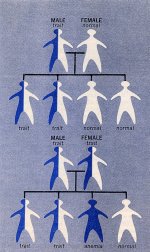|
In 1956 Pauling touched on a subject that he would promote for the next fifteen years
– genetic counseling for carriers of molecular diseases. In order to convey the chances
that a couple would have an unhealthy child, Pauling often explained the possible
genetic make-up of an offspring between two heterozygotes. "When two of the heterozygotes,
the carriers of the sickle-cell-anemia gene, marry, one-quarter of their children
may be expected to have the disease sickle-cell-anemia, one-quarter to be normal,
and one-half to be carriers like the parents."
Pauling advocated acknowledgment and action by carriers of genetic defects. He suggested
genetic counseling for prospective carriers as a way to stop the spread of molecular
diseases and minimize human suffering. Specifically, Pauling proposed that carriers
of a hereditary disease should avoid marrying another carrier and that couples as
prospective parents should consider whether or not to have children. Although people
could be tested for sickling hemoglobin, at this time no test existed that could determine
whether a person was a carrier of phenylketonuria.
Other scientists, who promoted counseling during the 1950s, invoked the same arguments
as Pauling. One method of prevention that Pauling encouraged was the universal introduction
of birth control.
|
|
Click images to enlarge

Ava Helen and Linus Pauling standing next to a large chemical model. [the alpha-helix?], 1963.

Illustration from Medical World News article, "Sickle Cell Anemia" December 3, 1971.
"As more and more tests for heterozygosity are developed, predictions can be made
with greater and greater reliability about the probability of birth of defective children,
and advice can be given to prospective spouses or parents about the desirability of
their contributing to the welfare of the human race as a whole by preventing the transmissions
of seriously defective genes to the next generation."
|

